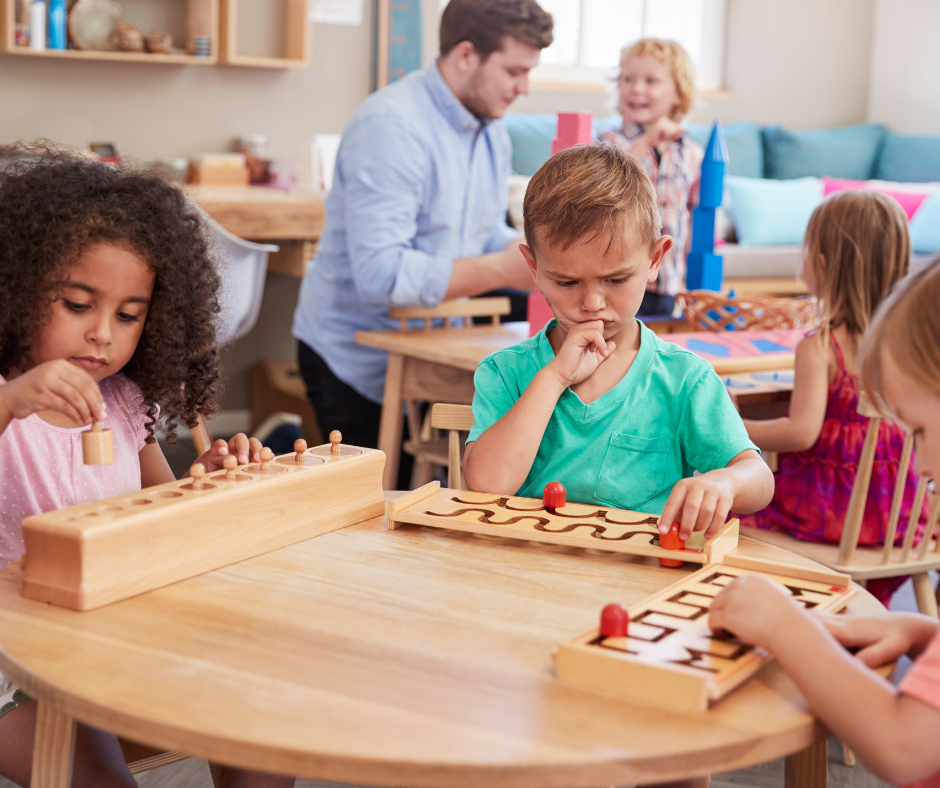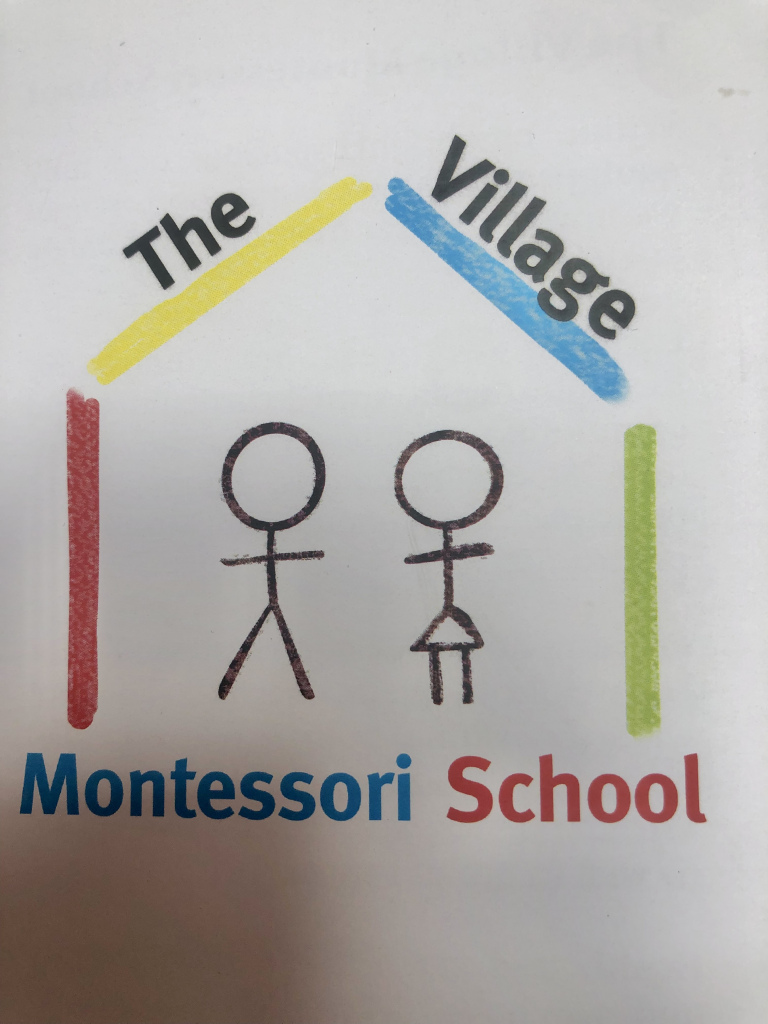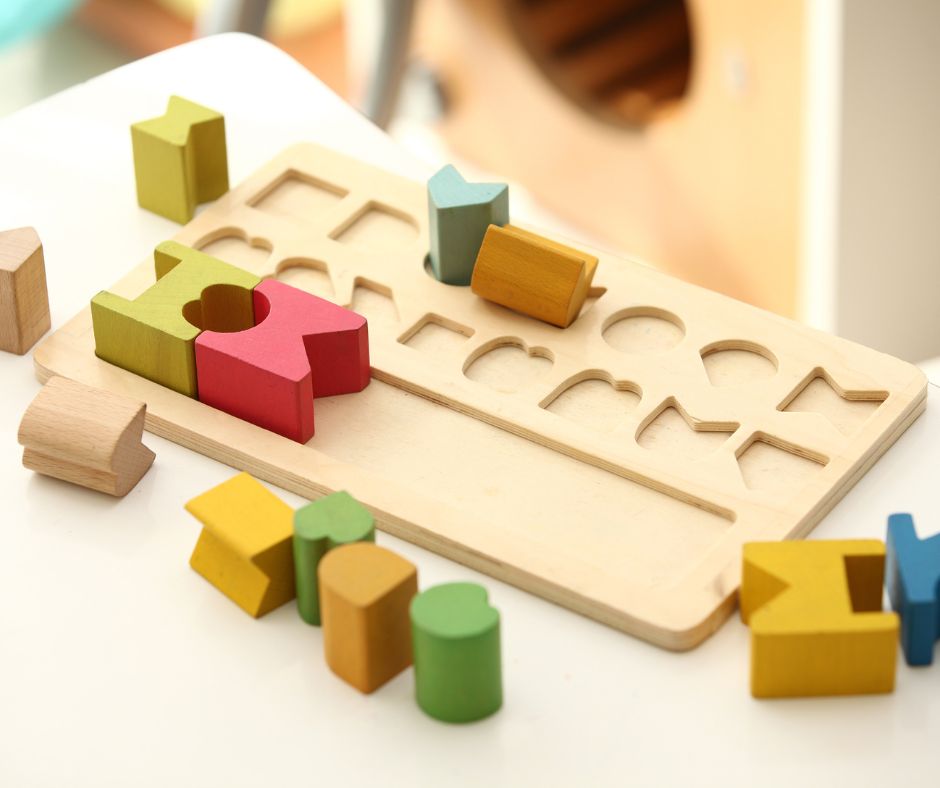Montessori/Daycare Teacher Position
The Georgian Montessori Primary School is a child-centred Montessori school for children aged 3-12 years, in Dublin 1. Established in 2017, the school operates a 9-12 years classroom, a 6-9 years classroom and a 3- 6 years classroom. We are open from 8am to 6pm and offer excellent childcare creating a home from home environment.
https://www.facebook.com/TheGeorgianMontessoriPrimarySchool


Position:
Montessori/Daycare Teacher
Full-time; to guide the children in a fully equipped Montessori primary school and daycare. This position would be best suited to someone who is passionate about Montessori education and enthusiastic about creating a child-centered, warm environment.
About the role:
- Guide, observe, stimulate and supervise children, as directed by the Principal
- Help direct the children’s activities academically, emotionally and physically in a prepared Montessori environment that challenges each child to reach their full potential in accordance with Montessori philosophy
- Organise and maintain a well-organised and attractively prepared environment consistent with Montessori pedagogy, paying particular attention to the needs of the children
- Observe and record observations on each child’s individual progression and create, review and maintain each child’s individual development plan ensuring they progress at a rate according to their abilities
- Observe, guide, supervise and assess children while they learn in the classroom environment and day-care settings providing support and encouragement during homework time
- Create and maintain a safe, clean, stimulating space where all children feel safe and valued
- Establish and build a positive relationship with children, their families and your co-workers
- Work with school staff as part of a team approach to delivering Montessori education to the highest standard
- Report to the Principal and attend school meetings as required including parent-teacher meetings, staff meetings, professional sessions, training and events on behalf of the school, e.g., parent evenings and family days
- Manage record keeping required for class operations, e.g., safety, fire, attendance and other records as needed
- Follow the school’s policies and procedures at all times
Requirements:
- Montessori qualification from St Nicholas, AMI or equivalent, Level 6 or higher
- 2 years post-graduate experience in a classroom preferred but not necessary
- Good understanding of Aistear and Siolta
- Good observational, planning and organizational skills with the ability to multitask
- Excellent communication skills – written and spoken English must be of high quality
- Be passionate about Montessori education and have an ability to teach groups of children of varying ages, needs and abilities
- Enthusiasm and creativity
- Certificates in First Aid, Children First and Manual Handling (or working towards them)
- Candidates should have residency or permission to work. Preferred candidate will be subject to Garda vetting and other police vetting, reference validation and qualification check as part of the selection process
We work together as a fully supportive team to create a Montessori learning environment and daycare for the children we cater for.
Competitive salary based on qualifications and experience.
Contact: Please forward your CV with cover letter to principal@thegeorgianmontessori.com
Read MoreJob Vacancy
The Village Montessori School based on Skehard Road, Blackrock, Cork have 2 vacancies for an early years educator. ( Start Date A.S.A.P )
The Village Montessori has 4 classrooms in a spacious purpose built school. We have a vibrant team that work together on all aspects of our job.
We pride ourselves in creating a warm, friendly environment for children, staff and parents.
The suitable candidate must have minimum level 6 in early years and garda vetting will be applied for.
Job Spec;
Hours: 08.00-16.00 Monday-Friday
Salary September-June Inclusive ( all school closures between September and June are fully paid )
Salary is above the new ERO recommendations for early years.
Please send your C.V to villagemontessori@gmail.com for the attention of Eithne a.s.a.p.


Montessori Assistant Teachers


St. Nicholas Montessori School is located in the heart of Dún Laoghaire. We are looking for two Assistant Montessori Teachers (3-6) to join our established team delivering excellence in Montessori education
Employer:
St. Nicholas Montessori Society CLG.
Position:
Montessori Assistant Teacher 3-6yrs
Start Date:
30/08/22
Hours:
8.30am – 2.45pm Monday – Friday
(2 days after school programme each week, 6pm finish)
Requirements:
The successful candidate must demonstrate a passion for Montessori education and a strong desire to work within a collaborative, authentic Montessori environment. Knowledge and experience of implementing the aims and learning goals of Aistear, The Early ears Curriculum Framework are required. The candidate should have the ability to promote a positive and supportive ethos where all pupils are valued, encouraged and challenged to achieve the best they can.
Qualification:
QQI Level 7/8 qualification in Montessori Education.
Garda Vetting and 2 references are necessary for this position.
CV to mary.farrelly@smsi.ie
Read MoreMontessori assistant teacher /early educator
The Village Montessori in Main St, Kilcoole, Co. Wicklow are hiring!
They are looking for a Montessori assistant teacher /early educator.
The person should have a minimum QQI LEVEL 5 in childcare.
Competitive rates.
If interested, please apply with cv to thevillagemontessori@mail.com


Montessori at Home: Job Opportunity
“We are looking for a kind, compassionate, experienced full-time nanny with at least 4 years of experience and ideally Montessori training, to start at the end of July. We have two happy, curious children, a boy and a girl, aged 5 and 4 years old.
Hours are 8am–4pm Monday to Friday. We are looking for a candidate that can engage the children with elementary learning, provide lunch and snacks, and supervise play and outings. We have a dog, so being pet-friendly is a must!. Some cleaning and general housekeeping relating to the children would also be needed.
A current First Aid certificate, Garda Vetting, and a driver’s licence is preferred. A Certificate in Child Care/Montessori will also be highly regarded. References are required.
The position is based in Dun Laoghaire.
Pay is negotiable based on references, qualifications and experience.
Please email CV to saracos@gmail.com


Sharavogue Montessori School now recruiting for September 2022 Montessori Teacher


The school is looking for an energetic & dynamic individual with a love for Montessori and Education.
Full-Time Role Monday – Friday Working as part of a Team Class age: 3- 6years
Salary negotiable.
Sharavogue is a long-established Montessori School in the Glenageary area. We have been in operation for over 35 years and are passionate about education. We have 9 Montessori Classes in our Montessori & Junior School up to 6 th Class. We have a lovely environment with large outdoor play areas and a great team.
We are centrally located close to the DART station.
All CV’s should be sent for the attention of the Montessori Manager : Linsey Byrne : info@sharavogue.ie
Read MoreEarly Years Educator Job Opportunity


Sessional and Part Time
Pixies Montessori are looking for Early Years Educators to join our team. We offer a great place to work and a competitive salary based on qualifications and experience.
Job Description :
Salary will be based on qualifications and experience.
Minimum QQI Level 5 or Minimum Level 7 in Early Childhood Education
Be able to provide a safe, caring, stimulating educational environment for children.
Ensure that our setting meets all regulations at all times.
Have a good team spirit
Support children’s development – emotional, social, physical and cognitive in a loving and caring way.
Have creative skills to develop age appropriate activities.
If you are interested, please send your CV to pixiesmontessori@hotmail.com
Read MoreMontessori teacher
In Hedley Park Montessori School
Job Offer


Hedley Park Montessori School in Merrion Square, Dublin 2, is a long-established, private independent junior and preschool for boys and girls, aged 2.5 – 13 years.
They are seeking a Montessori teacher to assist in our Primary classes under the guidance of long-established, experienced Montessori professionals. This position would be best suited to someone who is passionate about teaching and the Montessori method of education.
Position:
Full-time Montessori teaching with after-school duties.
Competitive salary based on qualifications and experience.
Start date, end of August 2022.
Requirements:
1) A passion for Montessori education.
2) Level 7 or 8 qualification in Montessori Education (minimum level 5).
3) Excellent communication skills.
4) Have the ability to teach groups of children of varying ages, needs, and abilities.
5) Be patient, and have excellent observational skills.
6) Have excellent planning and organisational skills.
7) Display a willingness to work within the school policies.
8) Certificate in First Aid.
9) References.
Contact:
Please forward your CV with cover letter to the Principal, hedleypark67@gmail.com
Afternoon childcare
Are you looking for a job in September? There is a job opportunity in Rathgar.


See the job ad below, please.
“We have 3 girls (9, 7, 4.5) in Rathgar who go to school in Ranelagh and we are looking for someone from September who can cycle them home from school in the afternoons from 3pm/4pm until we get home from work at c. 6pm; to supervise homework; feed them and help out during school holidays.
Please email shoran@lawlibrary.ie if interested.”
Read More20Q: Incorporating Montessori into Speech-Language Pathology Practice
Jennifer Brush, MA, CCC-SLP, Julia Johnson, MS, CCC-SLP


20Q: Incorporating Montessori into Speech-Language Pathology Practice
Learning Outcomes
After this course, readers will be able to:
- Describe key aspects of person-centered care for elders with dementia.
- Describe at least two ways to connect the Montessori philosophy of care with speech therapy services.
- List three key components of the Montessori philosophy.




1. Over the last several years there has been a shift in elder care communities from “institutional” to Person-Centered Care (PCC). What has this movement focused on?
Person-centered care (PCC) seeks to maximize participation of the person and his/her healthcare choices by focusing on the whole person, not only the disease. Person-centered care furthermore emphasizes the relationship between the healthcare recipient and professional as well as the context in which healthcare services are delivered (Kitson et al., 2013). A person-centered approach capitalizes on an individual’s remaining functional, emotional, and cognitive abilities and implements compensatory techniques when weaknesses are present. It takes into account individual factors of family, partnership, culture, and gender as the individual is a respected member of the healthcare team (Epp, 2003). Akin to the Life Participation Approach to Aphasia (LPAA), participation in meaningful, realistic, and naturalistic contexts are emphasized as avenues toward authentic communication opportunities. PCC finds its origins in the World Health Organization’s International Classification of Functioning, Disability, and Health which supports activity and participation in life irrespective of a person’s disease (WHO, 2001). Person-centered services for dementia person-centered approach to care places the person with dementia or other cognitive impairment in the ‘center’ of all decision-making. It emphasizes the inherent personhood, autonomy, and dignity of the human being, irrespective of documented cognitive impairment. As such, this philosophy of care supports uncovering capabilities, modifying the environment to support optimal functioning, and capitalizing on strengths of the individual.
2. As we look at speech-language pathologists providing services from the PCC approach, how are they qualified to provide services that are supportive of persons with dementia?
Speech-Language Pathologists are independent practitioners who are qualified to provide unique services to support communication for individuals with dementia (Swan et al., 2018). To meet the complex communication needs of elders with dementia, it is critical that SLPs provide services that maximize overall health outcomes and elder priorities. For example, treating a memory deficit outside of the elder’s natural context may not lead to functional improvement or be meaningful to the individual or their families. In as much as the field has progressed toward more functional approaches, social exchanges, and naturalistic contexts, it can still be challenging for SLPs to reprise the role of “coach” or “strengths detective” when serving individuals with dementia or other cognitive impairments. Although a strengths-based focus can support trust and positive relationships among the SLP and the person and their family, it may be difficult to implement for clinicians due to the need to rely on more informal measures such as interviewing and/or attending to person and family narratives (Tedeschi, Kilmer 2005). Providing evidence-based, skilled services also involves increasing engagement with elders and their families and optimizing the ability of those elders to participate in purposeful activities.
3. Who is Dr. Maria Montessori and how does her work play a role in the philosophies developed for persons with dementia?
Maria Montessori was an Italian physician and educator who pioneered an approach to education that builds on the way children naturally learn. She created learning environments for children in which everything was suitable for their stage of development and where obstacles to learning and development were removed. She observed how children absorb knowledge from their surroundings, essentially teaching themselves. Through scientific study, she designed learning materials that nurtured children’s natural desire to learn. She was an innovator, feminist, and idealist who believed that the path to world peace was through the education of children (Brush, 2020).
Dr. Montessori did not design environments for older adults, but researchers, clinicians, and architects have contributed to a large body of evidence that has resulted in aging and dementia care guidelines to bring engagement and purpose to elders with dementia (Brush, 2020).
4. What is Montessori for Aging and Dementia?
Montessori for Aging and Dementia is based on the principles of free choice and purposeful activity. In a Montessori community for elders, individuals with a wide range of abilities work both individually and collaboratively on an array of activities from which they are free to choose, explore, and discover (Brush, 2020). Elders have the freedom to move within the community and engage in household roles and responsibilities.
5. What key components are integral to having a Montessori community?
Dr. Maria Montessori believed that “an environment must be rich in motives that lend interest to an activity and invites the person to conduct his own experiences.” In a Montessori community for older adults, individuals with a wide range of abilities work both individually and collaboratively on an array of activities from which they are free to choose, explore, and discover. Elders have the freedom to move within the community, and to engage in household roles and responsibilities, guided as needed by trained Montessori staff. Montessori focuses on the well-being of the whole person, including physical, spiritual, social, mental, and emotional needs (Brush, 2020). This means that the community should offer opportunities for new learning, religious practices, meditation, art, music, and exercise. This is done by having a prepared environment, providing freedom of movement, elevating time for concentration, allowing for individual engagement, having community staff take time to observe, and providing grace and courtesy. Overall, it is an approach that helps individuals change the way they interrelate with elders with dementia by improving the quality of those interactions (Bourgeois, et al., 2015).
6. How can clinicians connect PCC and Montessori philosophies?
A Montessori approach to life ensures that elders with dementia participate in meaningful activities. In Montessori for Aging and Dementia, a person maintains their roles and identity throughout the full course of their life. This philosophy of care focuses on engaging the Montessori Person-Centered Services for Dementia for an older adult in an environment that is adapted to support memory loss and sensory impairment and facilitate independence (Bourgeois, et al., 2015). As a result, elders are empowered to care for themselves and others, make contributions to their community, and engage in meaningful activities. Montessori goals for individuals with dementia include: to enable individuals to be as independent as possible; to make important contributions and have a meaningful place in the home and community; and to possess high self-esteem (Brush & Norris, 2017).
7. In having SLPs work at the top of their licenses, is there evidence that supports the Montessori practices?
In addition to being appealing to elders and their families, Montessori activities additionally boast a strong scientific evidence base. For example, a significant reduction in antipsychotic and sedative medication was noted after the implementation of Montessori activities; this reduction in medication was noted to be maintained at an 18-month follow-up as well (Roberts, et al., 2015). The implementation of a Montessori environment resulted in more quality communicative interactions as well as improved overall well-being. Similarly, elders who engaged in Montessori training displayed fewer feeding difficulties and an increased ability to feed themselves independently (Shepard, McArthur, & Hitzig, 2016). The evidence to support Montessori-based interventions is present and continues to be accumulated; however, SLPs may struggle to connect results of these studies with the realities of their clinical practices.
8. What are the specific components of Montessori that are required for implementation?
The Montessori philosophy is a way of life that is found throughout a care community. With that said, there are several components that need to be incorporated in order for elders to engage, be purposeful, and live at their highest functional ability (Brush, 2020). They include: a prepared environment, freedom of movement, hands-on activity, intrinsic motivation, observation (by staff), concentration, individualized engagement, and grace and courtesy.
9. What does an SLP need to do to bring those components into their scope of practice?
SLPs have the ability to be investigators and to look at communication and task performance in a different way than other disciplines. In this way, during an elder’s initial evaluation and ongoing assessment, SLPs can use their understanding of communication, comprehension, executive function, and attention to identify areas that elders can be assisted with during treatment interventions. Then, those findings can lead to methods of engagement with other healthcare professionals and family members during daily interactions and activity performance.
10. What is an example of a “prepared environment”?
A prepared environment should support the individual by placing needed memory, visual, auditory, tactile, and olfactory cues in the environment. An orderly or visually organized environment provides useful cues and allows for attention to tasks. High contrast signage is used to compensate for memory deficits and invite the individuals to engage in the environment (Brush & Norris, 2017). For example, one might see a nicely framed sign by potted plants and a watering can that says, “Please water the flowers.” One can care for the environment by cleaning, washing, dusting, tidying, serving, folding, weeding, raking, planting, and so forth, as done in the past. In addition, when elders decorate and personalize their spaces with meaningful and beautiful items such as family photos, flowers, or their own handicrafts, they may create a sense of belonging to the environment (Calkins, 2018).
11. How do SLPs perform their assessments to incorporate these new concepts?
Understanding insurance and the need for as much standardization as possible, an SLP can perform a standardized assessment to gain objective data, but it is also recommended that they perform a person-centered assessment to drive intervention decisions. If the purpose of the assessment is to promote better functioning in one’s environment, standard assessments may not be very useful toward this goal. In this case, a contextualized evaluation will be of benefit. A contextualized evaluation involves assessing the person’s environment, communication partners, and current daily activities. In this way, the clinician “flips the rehab model” (Bourgeois, et al., 2016) and spends assessment time focusing on identifying cognitive-communication needs that will have robust impacts on day-to-day functioning.
12. What would be required to perform a solid contextualized assessment on an elder?
Identification of needs likely begins with observing the elder in his or her natural environment including during activities of daily living, meals, community activities, and interactions with staff. A review of the current medical chart, nurses’ notes, and conversations with staff will point the SLP toward useful intervention targets. Additional assessment items should also include sensory abilities, compensatory cues, reading, personal interests, occupation, social network, complaints and preferences, and environmental and social barriers to participation. The clinician needs to look at the elder as a whole in order to determine the best place to start treatment and what other individuals in the elder’s life need to be involved from the outset.
13. Is there anything additional that should be included in the standardized or contextualized assessment?
A reading assessment should be performed with each elder. Research indicates that reading is one of the last functions people with dementia lose, so knowing a person’s level of reading, size of font needed, and comprehension of information read is crucial (Brush, 2020). This will allow clinicians to assist care staff in creating cue cards and other visual cues that support the elder’s success during treatment as well as in the community. Reading assessments should be performed with phrases/sentences that increase in length and font size. In this way, a clinician can determine what size is required and what level of comprehension is present. This is also a good way to keep baseline data to know when an elder has a decline in function so cues can be changed for him/her for personal use.
14. Please share a scenario that could be used as an example for clinicians.
Mrs. Jones is 87 years old and was referred for speech-language pathology services because of a change in cognitive status, increased difficulty communicating her needs, and word-finding difficulties. Once a very social person, Mrs. Jones now remains in her room for most of the day. Information gathered from Mrs. Jones, her primary care partner at the care community, and her family revealed that she is a mother of three and a former second-grade teacher. She taught piano as a second job and enjoyed attending church services on a regular basis. Her husband passed away over ten years ago. She has been living in assisted living for three years. Staff has noted that she has been reluctant to leave her room recently and is not participating in activities. Mrs. Jones is ambulatory with her walker, reads at the short paragraph level (size 16 type, sans serif), speaks in complete sentences, and continues to play the piano. She has word-finding difficulties, easily becomes lost, and repetitively asks about her husband and her children. She often asks for her suitcase so she can pack to go home. She wears glasses and one hearing aid. Mrs. Jones is a typical elder that would reside in a community, but the difference will be seen in how the clinician creates intervention strategies for treatment and education for the care team.
15. Most SLPs have a good handle on what they would do with a client like this, so with the incorporation of Montessori, how does the focus change?
Mrs. Jones’ background and care needs will drive her skilled speech therapy intervention. Mrs. Jones is a mother, teacher, and church pianist, and her biggest care need is that she becomes restless and distressed upon the thought of her deceased husband. Intervention targets would be driven by Mrs. Jones embodying the roles of literacy leader and community pianist. So, as you can see, it takes the focus from task orientation in treatment to something larger for beyond the treatment space. How the clinician treats the elder won’t change, but how and where the clinician incorporates the “function” is the difference. PCC is based upon having the person “do” what they are still able to and by looking at treatment this way, the clinicians are following that prescription.
16. Clinicians understand and enjoy the concept of moving to function, but how does the clinician develop goals to address evidence-based practice this way?
Skilled speech therapy goals can be constructed by connecting the Montessori philosophy with evidence-based practices. The following goals highlight this connection:
- Mrs. Jones will decrease question-asking about her husband from 50 to 2 times per day when redirected to a personalized activity by reading a visual reminder card with minimal assistance.
- Mrs. Jones will decrease the number of times she waits by the elevator for her husband from 10 to 1 time per day by incorporating a reading to a friend activity immediately after meals.
- Mrs. Jones will initiate conversation from 0 to 3 times daily with at least 2 different elders in her community by inviting them to read or listen to her play the piano.
- Mrs. Jones will read large print short stories, newspaper and magazine articles of personal interest to another individual with dementia who has lost her reading skills by referring to an external cue card on her walker from 0 times per week to 4 times per week.
- Mrs. Jones will engage in playing the piano which capitalizes on her residual procedural memory and communication skills, given appropriate environmental cues and supports in 8 out of 10 weekly opportunities (Hopper, Douglas, & Khayum, 2015).
17. For many care communities, this may be a departure from the daily culture, so how can clinicians educate/train care team members on the strategies they are employing with the elder during treatment?
Evidence-based approaches are also available to the SLP in terms of staff training on communication supports and strategies. For example, role-play, deliberate practice and coaching models support the transfer of knowledge to needed behavior changes. Effective training programs tend to employ multiple modalities such as video, print, and live demonstration and they are tailored to the specific needs of the individuals. Training in short, “in the moment” bursts are often more impactful than a longer didactic session and a collaborative approach is often helpful. By recognizing the contributions of the trainees and attending to outcomes data of training, SLPs can provide skilled intervention in this arena as well (Knowles, Holton, & Swanson, 2005).
18. To change the direction a little bit from skilled treatment to early identification of persons having MCI, how can clinicians assist them with the use of Montessori principles?
SLPs have a great opportunity to play a pivotal role in the community to provide support and education for this population (Bourgeois, et al., 2016). Most SLPs are more than familiar with the barriers of introducing treatment or strategies to elders in the early stages. Often being met with, “I don’t have any problems with my memory.” Or, “I am able to take care of xxx without any trouble, who said I have a problem with that”? In these cases, SLPs need to be well educated in dementia to understand nuance and evidence-based interventions and be reliable with those interventions during treatment (both inpatient and outpatient treatment). So, having assistance from the care community to implement some basic changes with the type of activities elders can access or participate in (group or individual), brighten up spaces with paint or décor that helps with wayfinding, or even something as simple as having everyone where name tags (elders included) at least at community events (Brush, 2020), helps everyone feel included and at ease.
19. The number of elders with dementia and other neurodegenerative diseases will continue to rise for years to come. What is a takeaway for clinicians who may be new to treating this population?
Our role as SLPs should be to help a person with cognitive impairment to live the life they choose to live. We can achieve this by identifying and capitalizing on their spared abilities, modifying the physical and social environments to support their impaired systems such as memory, and continually supporting and involving families and care staff through the entire process. Helping others adds purpose and meaning to our lives. People with dementia have the same desire to contribute to their households or the community; the need to be productive does not end once the diagnosis of dementia has been given (Bourgeois, et al., 2016). These elders require positive reinforcement that they are valued even if what they contribute is different than it once was.
20. As SLPs finish reading this how can they do more for the elders in their care communities?
The range of cognitive impairment and the diversity of treatment needs of these persons necessitate a variety of meaningful interventions that are tailored to the specific needs of the individuals. Effective rehabilitation interventions for elders with dementia include more than using memory interventions or creating reminder cues. A person-centered approach means that care teams collaborate to provide opportunities for independent functioning and achievement of functional goals. SLPs are encouraged to enhance their methods of providing person-centered care for individuals who are living with dementia by incorporating the Montessori philosophy. As SLPs, our role is to collaborate with individuals with dementia, to help them uncover strengths in their abilities, and to help them succeed at doing what they want to do.
References
Bourgeois, M., Brush, J., Douglas, N., Khayum, R., & Rogalski, E. (2016). Will you still need me when I’m 64, or 84, or 104? The importance of speech-language pathologists in promoting the quality of life of aging in adults in the United States into the future. Seminars in Speech and Language, 37,185-200.
Bourgeois, M., Brush, J., Elliot, G., & Kelly A. (2015). Join the revolution: how Montessori for aging and dementia can change long-term care culture. Seminars in Speech and Language, 36, 209-214.
Brush JA., Norris K. Getting started with Montessori volume 1: practical life activities for Elders. Brush Development; 2017.
Brush, J. Montessori for Elder and Dementia Care. Health Professions Press. (2020)
Calkins, M. (2018). From research to application: supportive and therapeutic environments for people living with dementia. The Gerontologist, 58, S114-S128.
Epp, T. (2003). Person-centered dementia care: a vision to be refined. The Canadian Alzheimer Disease Review, 14-18.
Kitson, A., Marshall, A., Bassett, K., Zeitz, K. (2013). What are the core elements of patient-centered care? A narrative review and synthesis of the literature from health policy, medicine and nursing. Journal of Advanced Nursing, 69, 4-15.
Knowles, M, Holton, E., Swanson R. (2005). The adult learner: the definitive classic in adult education and human resource development (6th ed).Boston: Elsevier; 2005.
Roberts, G., Morley, C., Walters, W., Malta, S., Doyle, C. (2015). Caring for people with dementia in residential aged care: successes with a composite model featuring Montessori-based activities. Geriatric Nursing, 36,106-110.
Sheppard, C., McArthur, C., Hitzig, S. A systematic review of Montessori-based activities for persons with dementia. (2016). Journal of the American Medical Directors Association, 17, 117-122.
Swan, K., Hopper, M., Wenke, R., Jackson, C., Till, T., Conway, E. (2018). Speech-language pathologist interventions for communication in moderate-severe dementia: a systematic review. American Journal of Speech-Language Pathology.
Tedeschi, R., Kilmer, R. (2005). Assessing strengths, resilience, and growth to guide clinical interventions. Professional Psychology: Research and Practice, 36, 230-237.
World Health Organization. International Classification of Functioning, Disability and Health (ICF) Geneva: World Health Organization; 2001.
Citation
Brush, J. & Johnson, J. (2022). 20Q: Incorporating Montessori into Speech-Language Pathology Practice. SpeechPathology.com. Article 20515. Available at www.speechpathology.com
Read More